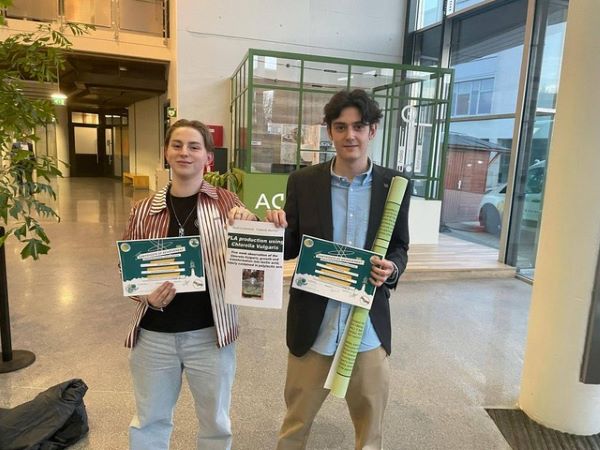 (L-R) Noah Lindenlaub; Fréderik Mortier;
(L-R) Noah Lindenlaub; Fréderik Mortier;
The Fondation Jeunes Scientifiques Luxembourg (FJSL) has announced that three teams from Luxembourg will represent the country at the 36th European Union Contest for Young Scientists (EUCYS), which will take place from Monday 15 to Saturday 20 September 2025 in Riga, Latvia.
In the lead-up to the event, Chronicle.lu spoke with some of the Luxembourg participants about their projects, as well as their journey and expectations for the experience.
Organised each year by the European Commission, the EUCYS brings together young scientists aged fourteen to 20 who have won first prizes in national science competitions. Participants can enter the contest individually or as a team of up to three. They present their research to an international jury and the wider public, while also taking part in cultural and educational activities.
This year, the Luxembourg delegation, accompanied by FJSL Programme Leader Guillaume Trap, will be represented by three projects: "A scalable platform synchronising Bitcoin mining with live renewable energy for carbon neutrality" by Lenan Du and Fanxi Jiang (both seventeen); "AURA: a bracelet for skin protection through cancer and UV detection" by Shaheen Aljourdi and Rodrigo Von Mayer Goulart (both seventeen); and "PLA production using Chlorella Vulgaris" by Noah Lindenlaub and Fréderik Mortier (both eighteen).
Chronicle.lu first spoke with the AURA team to learn more about their project and their preparations for EUCYS 2025, and next spoke with Noah Lindenlaub and Fréderik Mortier, who are the creators of "PLA production using Chlorella Vulgaris".
Chronicle.lu: Please tell us about your experience so far and your journey leading up to the EUCYS.
Noah and Fréderik: On how we got involved in the EUCYS adventure, we have to thank our Physics teacher, Lieve Stockmann, as she thought it would be a good idea to invite Mr [Guillaume] Trap to our school to present the Luxembourgish Jonk Fuerscher Contest. We then decided to participate with our current project with which we proceeded to win the contest and thus our ticket into EUCYS. For the past weeks and months, we have been working hard to finish our project, submit the needed documentation and prepare our posters. It has been an exhausting time but we hope the experience will be worth it.
Chronicle.lu: Briefly describe your project. Why do you think this type of research or innovation is important today?
Noah and Fréderik: In our current era, climate change is one of the biggest problems of society and thus we saw an opportunity to make a project in the area of carbon capture and usage (CCU). Using our algae, we capture CO2 from the air and store it in the cells that proceed to transform into sugar, which we then use to make lactic acid and, afterwards, PLA, a form of biodegradable plastic.
Chronicle.lu: When you first decided to collaborate on this project, what shared passion or other reasons drew you to work together?
Noah and Fréderik: In our class, we were the only two willing to participate, so we decided to form a team and look for project ideas. There were no real challenges except finding time together to work on the project. The benefits are always having a second view and perspective as well as not having to do it alone which can motivate and be fun.
Chronicle.lu: What long-term impact do you hope this experience will have on your future (whether academically or personally)?
Noah and Fréderik: We hope to make new friends and connections for the future, as well as inspire people to try to change the world as we tried or to use our thought processes to elaborate and apply our project.
Chronicle.lu: In what ways do you think your project could benefit society if developed further?
Noah and Fréderik: We think it could have an impact on large businesses' CO2 emissions and thus on climate change in general. An expansion of our project to an industrial scale could benefit society in many ways, such as making it greener and cleaner.
EO









